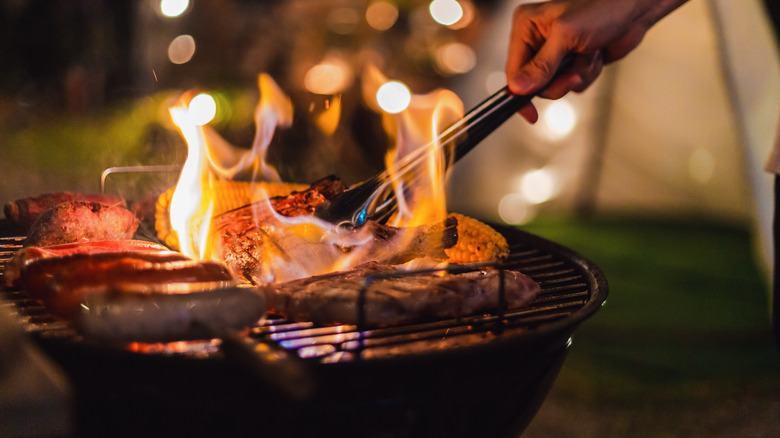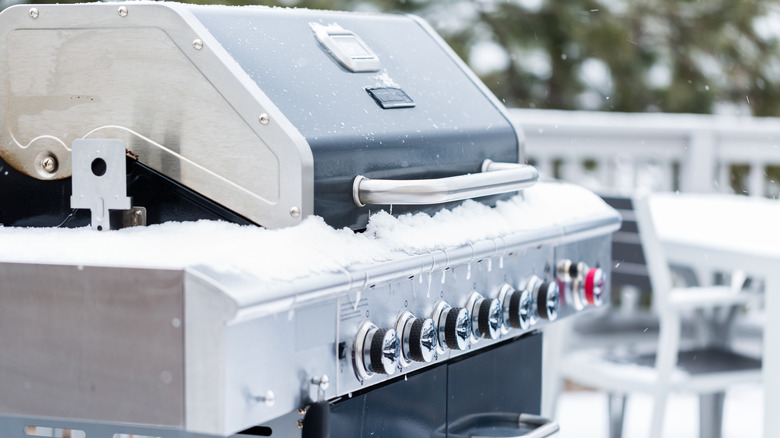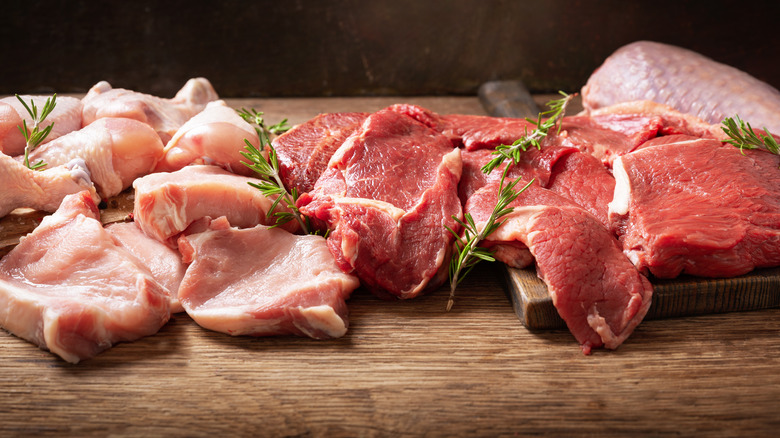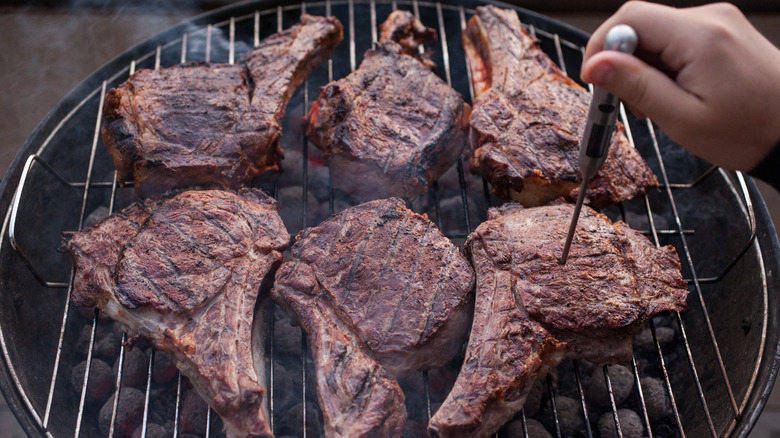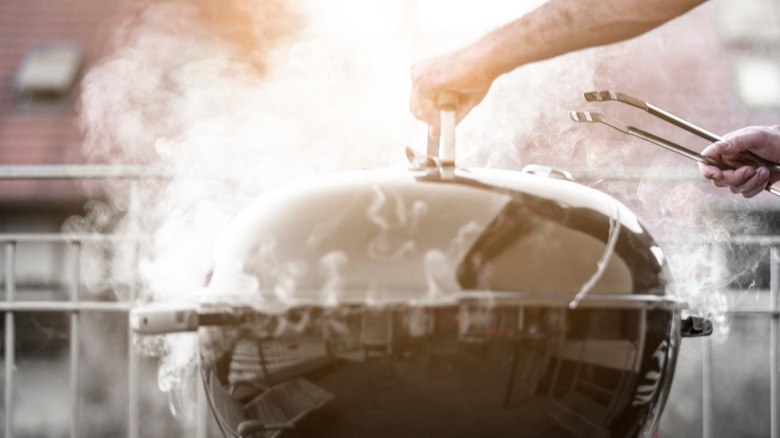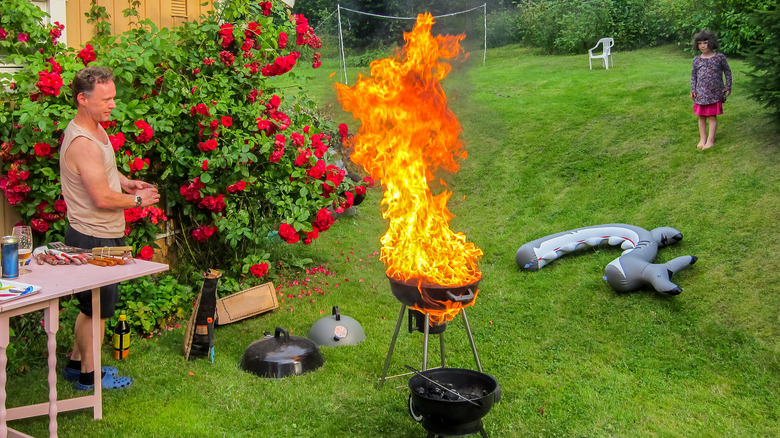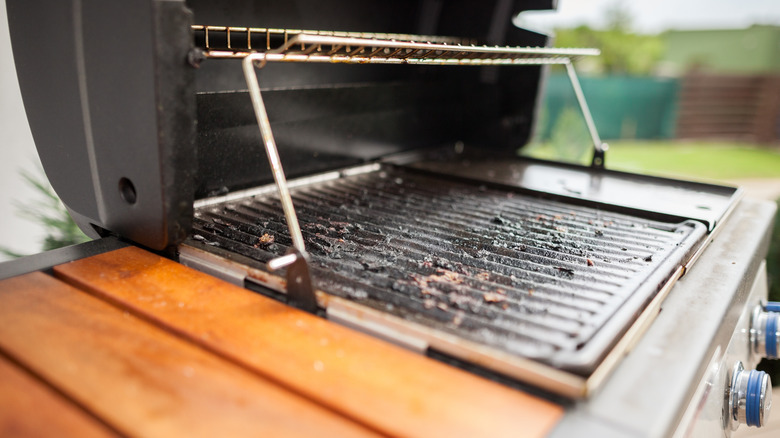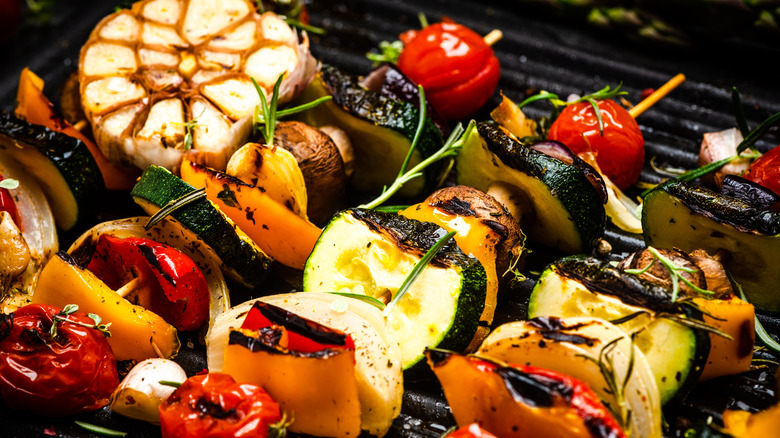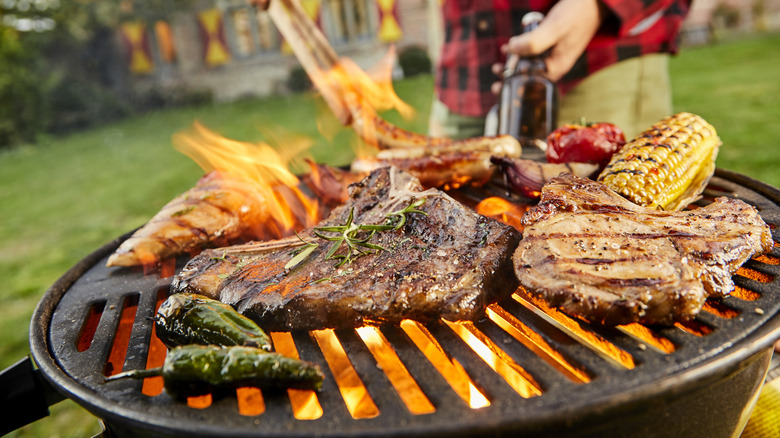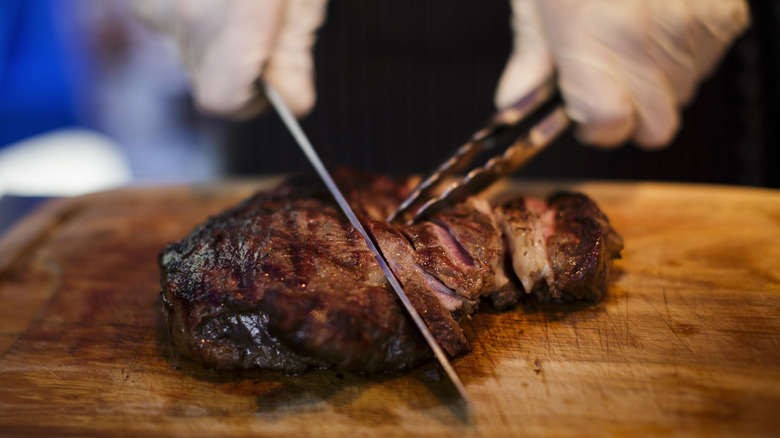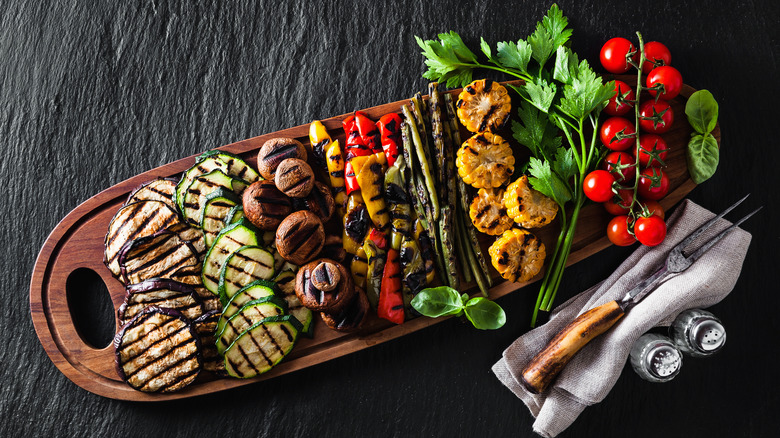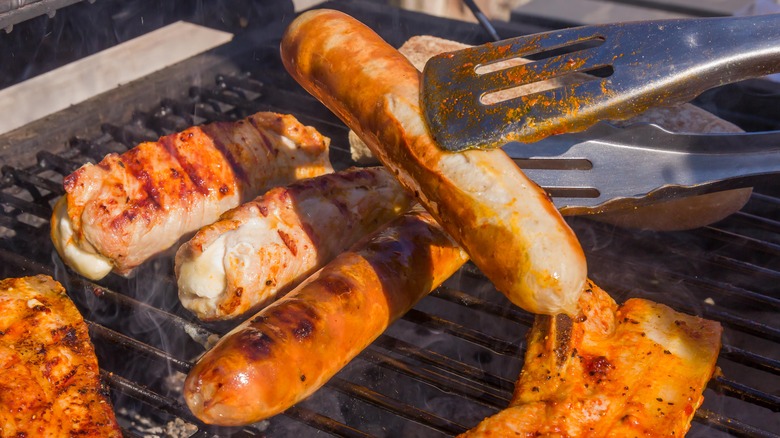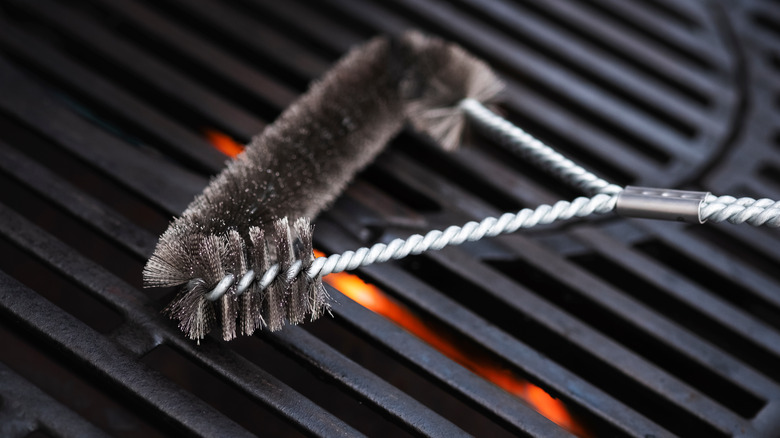The Biggest Grilling Mistakes People Make
It's the most wonderful time of the year (no offense, Christmas). When the weather gets warmer, the days get longer, and the air, somehow, tastes lighter, it can only mean one thing: it's time to bust out your grill from its winter storage, and kick off the glorious period known as grilling season.
There's just something about the summertime that instills a desire to cook your meals outside, over a roaring fire — as if you're preparing food the way nature always intended. We're not here to play favorites between propane gas and charcoal — we're not Hank Hill, after all — and it doesn't matter which grilling method you prefer to prepare your meats and veggies. Whether you want to taste the meat or the heat, the bottom line is that nothing can top a plate full of nicely charred, freshly grilled items.
Since many of us have a rather limited window to utilize this king of all cooking options, it's important to optimize your efficiency when you're able to grill. Yet no one's perfect, and even the most-seasoned grill master may be prone to a mistake here and there. If you're curious about any areas of potential improvement in your own grilling game, read on, and discover the biggest grilling mistakes people make.
Don't let grill heat up enough
Patience isn't exactly in high-demand in our society, where instant gratification is often prioritized. We get it, of course, particularly when it comes to grilling. Once that smoky smell penetrates your olfactory system, it can warp even the calmest chef into a grill-obsessed fiend.
Like any other cooking method, though, you can't just turn on the grill and hit the ground running. The cooking appliance has to heat up before it's ready, and it throws off the cooking process if you start grilling too soon. This, in turn, will diminish the quality of your meal, while increasing the likelihood of food sticking to the grates, per Kitchn.
But preheating a grill doesn't just improve the final product. According to Real Simple, it lowers your risk for exposure to any potentially harmful bacteria that may remain from a previous grilling session. Giving your grill the time to heat up can burn off any residual food particles, and kill whatever microorganisms may be lurking on the grates. Frankly, while you may not want to wait, there are clear reasons to do so. And if you've waited 12 hours while your steak tips marinated? You can manage the 15 or so minutes more it takes for a grill to heat up.
Not letting meat rest before cooking
Some may believe this is little more than a misguided myth, and a guaranteed recipe for food poisoning. But as Bon Appétit notes, there's a genuine method to the madness of tempering meat by letting it sit at room temperature for a period of time before cooking it... even if you're not actually going to bring a cold piece of meat up to 70 or so degrees within a couple of hours.
The main source of rationale for this pre-cooking process is that it induces a more evenly cooked piece of meat once it hits the grill. Since a fridge that functions properly will keep your meat below 32 degrees internally, there's a legitimate risk of overcooking the exterior while undercooking the center — think a burger burnt to a crisp, yet still frozen solid in the middle.
Just how long you should take your meat out of the fridge before cooking depends on the protein itself, though suggested times often range from a few minutes up to two hours. According to celebrity chef Gordon Ramsay, for steaks, you'll want to let them rest at room temperature for at least 20 minutes, so you're not using a product that is, as he put it, "stone cold in the center."
Not using a meat thermometer
No matter how you like your food prepared, there's a precise level of cooking required to ensure it both reaches the necessary level of doneness, and doesn't go careening past the point of no return. There's no joy in eating a grilled chicken breast still clucking, and serving a steak that's turned into a hockey puck defeats its own purpose — as Jake LaMotta would tell you.
Of course, unless you have some sort of X-ray vision capabilities (which, well, you almost certainly don't), you can't simply eyeball a piece of meat and accurately gauge its internal temperature. So if you want to make sure you're enjoying the most appealing and appetizing meat off your grill — temperature-wise and aesthetically speaking — make sure you're using a grill-compatible meat thermometer. Most beef, pork, poultry, and fish requires a minimum internal temperature between 145 and 165 degrees, per Beef Loving Texans. Using a meat thermometer eliminates any potential guesswork about reaching that temperature when cooking, ensuring you won't need to cut into your meat to check the doneness. This, in turn, allows crucial juices to be retained, while leaving those perfectly placed diamond grill marks intact.
According to Master Class, to ensure the highest level of accuracy, you should check the meat's temperature at its thickest part, and leave it on the grill during the process.
Leaving the cover on (or off) too often
There are two main ways food cooks on a grill: searing over the flame, which, when the cover is off, is the sole heating source; and closing the lid to trap heat inside, like an oven, which allows food to cook more evenly, per Epicurious. Searing food is, of course, a key element to grilling. But for pieces of meat thicker than ¾ of an inch, you'll want to keep the lid down more often, so its center cooks in conjunction with its exterior.
Both methods are crucial to success, since grilling food isn't like using a Showtime rotisserie oven — and the path to perfectly grilled products isn't to simply "set it and forget it." But while a combination of searing (with no cover) and trapping heat (with the cover on) is generally necessary to achieve top-notch grilled items, the precise manner of operation differs between gas and charcoal grills.
While keeping a gas grill covered will indeed keep the inside hot (with its consistently filtered-in heat source), a covered charcoal grill will actually decrease in temperature, per Smoked BBQ Source. This is because charcoal burns based on its oxygen exposure, so when a charcoal grill is covered, it loses the ability to continue heating. Hence, the existence of vents on a charcoal grill cover, which keeps oxygen flowing in — while still trapping much of the internal heat, to help your food cook evenly.
Using the wrong grilling method
You wouldn't try to hard boil an apple pie, and, if you did, we're not sure we'd want to see the end result (actually, on second thought, we would). But just like you wouldn't want to spend your time and money on an ill-fated dessert, you shouldn't make the mistake of buying a beautiful piece of meat... only to turn around and grill it in an inexplicable manner.
While accidentally cooking something incorrectly can be frustrating in any situation, it's doubly annoying when you waste an opportunity that's inherently time-limited, like grilling. Given there are so many styles and variables to consider when grilling — such as direct versus indirect heat, the nuances of your grill's hot and cold spots, and the subtle differences in how charcoal and gas grills operate, per Grill Masters Club – it's worth taking the time to research the best approach for whatever you're about to grill. That way, you won't end up ruining a rack of ribs by cooking it directly over high heat on an uncovered grill.
The manner of grilling itself is undoubtedly important, but it may be just as vital to properly prepare your items before they hit the heat. And the odds of nailing the execution of some items, such as chicken, can be upped if you take your time while preparing the item.
Using dirty grates when grilling
When you cook a meal in your kitchen, do you clean the pots and pans after you've used them? Of course you do... we hope. Given how inherently gross it is to even consider, few would ever reuse a frying pan or roasting dish after cooking with them. Yet for whatever reason, so many of us are willing to reuse dirty, uncleaned grates when grilling. The charred remnants of last week's barbecued chicken won't improve the flavor profile of tonight's fresh piece of swordfish. In fact, it's more likely to ruin your meal, and leave a bitter taste in your mouth from having wasted time, food, and money.
The stomach-turning thought of tasting old, burnt food isn't the only concern with reusing dirty grill grates, either. An improperly or inconsistently cleaned grill can become a fire hazard due to the potential build up of grease spots. And, more than that, cooking on a less-than-clean grill leaves you susceptible to any number of food-borne illnesses from leftover food bits, given the likely presence of harmful bacteria.
In order to experience the best your grill has to offer, and reduce your risk of food poisoning, make sure you're cleaning the grates before or after you use it — and do so when the grill is hot, per CNET.
Grilling all vegetables in the same way
Don't worry, vegetable lovers, we've got you in mind... because we're a group of veggie-obsessives, too. Maybe you don't win friends with salad, but if you're serving a platter of nicely blackened corn on the cob, asparagus, and sweet potatoes? Well, assuming they're properly seasoned and salted — unlike far too many "Chopped" contestants' food, according to judge Geoffrey Zakarian — then you may find your Facebook account blowing up with friend requests.
Of course, you won't enjoy a bounty of deliciously grilled veggies if they're raw, botched, or torched into oblivion. But no different than how you can't presume all meat grills the same way, it's crucial to remember there's no one-size-fits-all grilling technique to cooking vegetables. In other words, if you're assuming a whole potato will cook the same way as paper-thin slices of squash and zucchini, you're essentially asking to be let down.
Suffice to say, it's important to adjust tools, temperature, and time accordingly when grilling vegetables. As food author and chef Ed Harris told Mashed, "It really depends on what you are grilling, and how long it needs to cook." Some items, like small tomatoes, need a short time over high heat, while others, such as portobello mushrooms, require lower heat and a longer cook time, per Food&Wine. Whatever vegetable you bring to the grill, do yourself a favor, and make sure you're cooking it in the best manner possible.
Not utilizing a grill's hot and cold spots
If you've ever grilled, you've likely noticed that some areas are more directly heated by the underlying flames than others. This isn't some random coincidence you've stumbled upon, but rather a natural result of how a grill functions. In fact, every grill has its own quirks, with a unique set of both hot and cold spots.
It may be challenging to wrap your head around, but it's actually quite common for both gas and charcoal grills to contain patches of higher or lower heat. This may make more sense with charcoal grills, given charcoal is inherently more difficult to heat evenly, but it's just as prevalent in gas grills — and is actually easier to navigate than a charcoal grill's hot and cold spots.
Because a gas grill heats itself in a uniform manner, its hot and cold spots stay consistent each time you cook, so you can identify and utilize them. This can be done, according to Food Network, by taking a loaf of bread, spreading the slices evenly over the entire grill, then cooking them for one minute on each side. Since some bread slices will be darker or lighter than others, you'll be able to recognize the pattern of your grill's hot and cold spots. Understanding your grill's hot and cold spots will give you a leg up when it comes to grilling, ensuring you're able to avoid a batch of simultaneously over and under-grilled foods.
Not letting meat rest before cutting
When it comes to cooking meat, there may be nothing more widely known and discussed than the need to let it rest, after you remove it from the heat, before cutting into it. It's certainly a challenge to sit there and wait once you've finished grilling a ribeye or a pork chop. But if you want your grilled protein to be as succulent as possible, you'll need patience before diving in.
There are two main reasons why it's so crucial to let meat rest before cutting into it. First, despite what common sense may dictate, removing your meat from the grill doesn't instantly stop the cooking process. In fact, most proteins continue cooking for several minutes after removal from a heat source, so waiting for a short time — generally 10-20 minutes — ensures you aren't carving into a still-cooking rack of lamb, per Kitchn. Additionally, a meat's juices are affected by the cooking process. As chef Angie Mar noted in Martha Stewart, "If you rest it, it allows everything to relax and redistribute the juices, which creates a more tender, juicier cut."
You're more than welcome to buck conventional wisdom, and choose to slice your meat the instant it comes off the grill — but you're far more likely to enjoy the best possible meal if you delay gratification for just a few minutes more.
Not grilling enough vegetables
Americans don't eat nearly enough fruit or vegetables, which is a problem given the numerous health benefits provided by produce products. While a host of techniques exist to essentially sneak vegetables into your diet, grilling them may be a simpler, and more flavorful, way to increase your vegetable intake.
Clearly, no cooking method is more reliably delicious than grilling, so why wouldn't you try to incorporate more vegetables into your diet by incorporating them into your cookout? There are a vast number of options beyond the old reliable (and, admittedly, scrumptious) corn on the cob, and virtually any vegetable can be utilized to near-perfection on the grill, according to The New York Times.
So do yourself a favor the next time you fill your propane tank, or grab a fresh bag of charcoal. Load up on broccoli, asparagus, or any other vegetable you'd like; you won't regret it.
Not flipping the meat enough
Some may see this grilling mistake and cry shenanigans. After all, how can you ensure the distinctive look and flavor found from grill-seared items if you don't let the food sit and, well, sear? It's certainly true that you do, in fact, want to let whatever item you're grilling have the time to sit and cook without disruption. And if your aim is presentation above all else, flipping your grilled foods more often will reduce the chance of producing crisp, clean grill marks.
But if you don't have the precise and steady hand needed to create those undoubtedly beautiful diamond grill marks, you may want to consider flipping foods far more frequently on the grill than you're used to doing. Because despite what some may believe, you'll still be able to create a lovely sear, and flipping grilled foods more often won't impact the smoky charred flavor that you crave.
Not only will you still obtain a delicious crust on your food, but items are prone to cook faster, and more evenly, when you flip them more often, per Serious Eats. And frequently flipping grilled items may reduce the risk of ingesting potentially cancer-causing compounds — HCAs (heterocyclic amines) and PAHs (polycyclic aromatic hydrocarbons) — which develop when meat is cooked at an extremely high temperature, according WebMD.
Not cleaning the grill when hot
Unless you're Danny Tanner from "Full House," you probably aren't overly enthusiastic about the prospect of cleaning your grill — either before or after you use it. But given the undeniable reality that cooking on a dirty grill is nasty, dangerous, and a bona fide way to ruin whatever you're grilling, there's no avoiding the pesky nuisance of cleaning it off between meals.
Now, since all things aren't created equal, you can't just decide to clean your grill at any old time and expect the same results. If you want to remove all possible residual food from the grates, while killing off any potentially unsafe microorganisms, you can't try to clean it when it's cold — you need to do so when it's really hot. Per BBQ Champ, the high heat causes whatever residue may remain to burn away or evaporate, ensuring you're truly cleaning your grill's grates as much as possible.
Some of the more disciplined among us may prefer to clean their grill immediately after usage, when it's still hot. While this will work, if you're a bit more inclined to simply eat after cooking rather than giving it a scrub right away, heating and cleaning your grill before using it works just as well, per Weber. No matter when you do it, just make sure the grill isn't chill.
